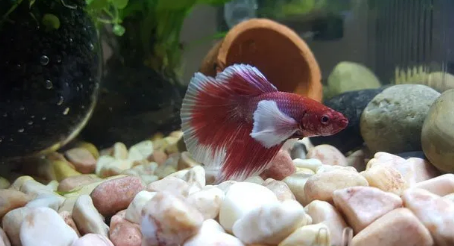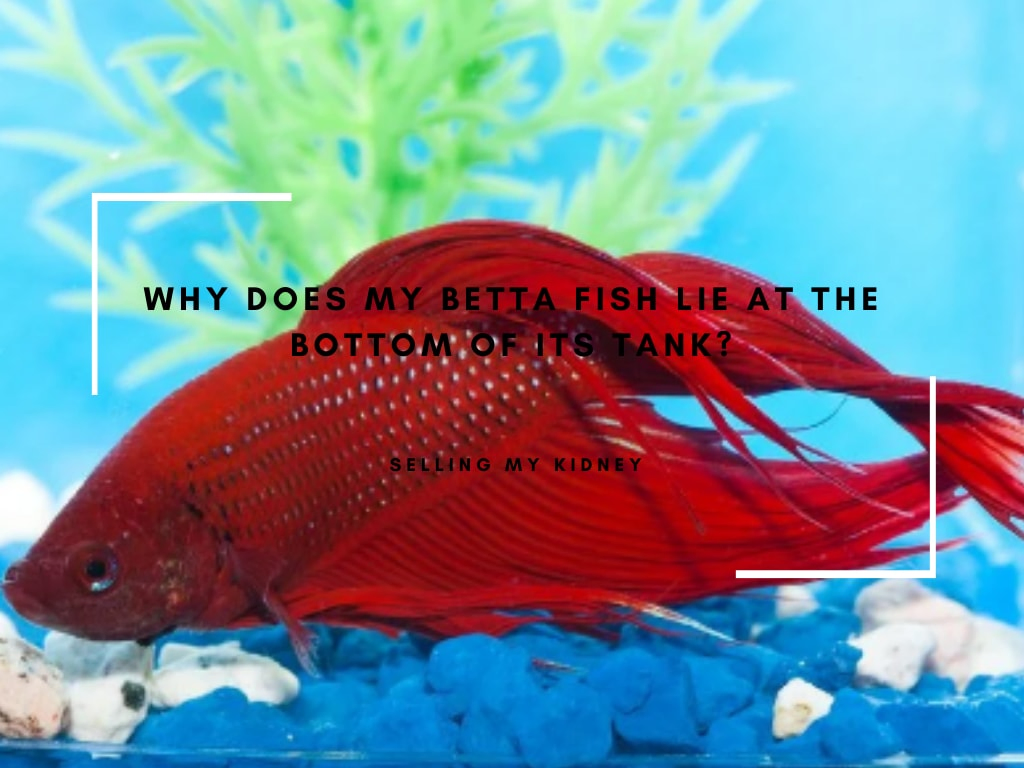It can be concerning to find your betta fish lying at the bottom of its tank. Betta fish are unlike many of your other pets in that we usually don’t see them lying down to take a nap.
If a betta fish appears to be snoozing at the bottom of its tank, this could be indicative of a severe medical problem.
If you see your betta lying at the bottom of their home, it can be easy to start to panic. It is certainly abnormal behavior, but the good news is that you don’t need to freak out just yet.
There are lots of instances where fish just act weirdly because of their personalities. You have to ask yourself – should I be afraid for my fish?
Lying at the bottom of the tank alone isn’t much of a cause for alarm. However, if this is accompanied by other symptoms or during environmental stressors, you should take action.
As a pet owner, any suspicious behavior should be examined and addressed.
Learning more about the needs and tendencies of the average betta fish can prepare you for making an informed judgment about the state of your pet.
Would you like to have a healthy betta fish? Consider the following explanations to learn why your betta fish lies at the bottom of its tank.
Why is my betta fish lying on the bottom of its tank?

There are several reasons why your betta might be lying at the bottom of its tank.
Although a betta can’t tell you what is wrong, you can investigate whether the following common scenarios apply:
Ammonia Poisoning
If you do not regularly change the water in your tank, it will become full with harmful chemicals created by the waste of the fish. When this happens, the fish can become stressed or sick.
Betta fish are not a particularly “dirty” fish, and it takes a lot for the ammonia levels to spike quickly in a good set up.
Make sure that your tank has a filter, and that you perform regular water changes.
Checking if the ammonia levels are high is easy and just requires a small test. If you don’t have
the testing kits or strips, consider taking a water sample to a pet store. Many pet stores will conduct water quality tests for free on-site.
Temperature Shock
Betta fish prefer to live in relatively warm water. If their tank doesn’t have a heater, cold temperatures from outside may be enough to make them sick.
They may swim to the bottom of the tank to stay warm or just because they don’t feel well enough to swim.
It is highly recommended that you invest in a heater unless you live in a warm climate.
Swim Bladder
The swim bladder is the organ which allows the fish to control their buoyancy. When the bladder is disrupted, they can have problems being able to float in the tank.
If your fish is swimming oddly or not floating at all, they may have a problem with their swim bladder.
This is pretty normal, and we will explore what you should do about this later in this article.
Resting/ Sleeping
Betta fish do sleep and when they do, they stay motionless for a while, just like we do. When a betta needs to sleep, it may lie in a plant or on the bottom of a tank. The thing is because they are nocturnal, we rarely get to see this.
Stress/ Disease
When a betta is stressed out, swim bladders are not the only problem. Other diseases such as fin rot and ich can wreak havoc with the health of your betta.
If you notice any other symptoms, such as faded scales, white spots, or ripped fins, your sulking betta may be very sick.
In the majority of cases, the required medicine can be picked up from your local pet store.
Tank is Too Small
Tanks which are too small cause a lot of problems for a betta and this might encourage it to sink to the bottom of the tank. Check our guide to Betta aquarium here
The stress of a poor living environment can cause a betta to fall ill.
Exhausting Filter Current
Filters are a great way of keeping waste levels down and water quality up. Ironically, just as they can help alleviate stress, they can also be the source of it.
If you have a filter which is of a higher power than it needs to be, this may add some extra stress on your betta.
Filters suck in water and spew it back out into the aquarium. Clean or not, this water can sometimes scare a fish.
When a fish is continuously frightened or stressed out, it may retreat to the bottom of the tank – the furthest point from the disruptive current.
It may also get stressed out by the pressure and fall ill. While it is not recommended to remove a filter altogether, there are some things you can do to make it more appropriate for your betta.
Firstly, check if there are options to shut the screen down a bit. If you can turn the power down, you may be able to make the filter work more effectively for your betta.
If not, consider replacing it. While it may seem like a good idea to use a filter which can handle more water than your tank has, you should remember that the power with which it takes water in and out is designed for a bigger aquarium.
Always consider the size of your tank when making a filter purchase.
Age
As betta fish become older, their stamina decreases. Unfortunately, no matter how much care and nurturing you offer your betta, it will not live forever.
If your betta is starting to sink to the bottom of the tank, it may simply be a sign of old age. Sadly, this may be an early indication that your betta fish is preparing to pass on.
A betta usually only lives for a couple of years after you buy it from a pet store. Although there are several exceptions, don’t expect your betta fish to live for decades.
All you can do with an elderly betta fish is to make sure that you give them the best possible quality of life.
Too Little Oxygen
If your betta is not getting enough oxygen, it may slowly drift towards the bottom of the tank.
While this is typically not a problem with fish from the gourami family, it can be a wise investment to take some precautions. For starters, make sure that the top of your tank is clear so that the betta fish can approach the surface in some areas.Secondly, it doesn’t hurt to add a small bubble to the tank.
Is it normal for a betta to lie at the bottom of its tank?
After conducting the appropriate water quality tests and ensuring that the betta has a sufficient living environment, you may notice that the lying persists.
If there appears to be nothing wrong with the fish’s heath, it may just be a little quirk it has.
While this behavior isn’t normal and can often signal that something is wrong, it might just be that your betta likes to do it. There is nothing harmful in the action itself.
That being said, it can sometimes appear that nothing is wrong when there is, in fact, a hidden cause hiding beneath the surface.
Why is my betta fish at the bottom of its tank on its side?
A betta that is lying at the bottom of its tank, especially on its side, often has problems with its swim bladder.
There are many secondary effects of being unable to swim to the top of the tank.
While the swim bladder itself might not be directly causing them too many problems, there are plenty of indirect ways in which your betta will be impacted.
For one thing, betta food generally floats at the top of the tank. Bettas are more prone to eat the food they see floating due to evolutionary triggers.
If your betta struggles to get to the top of the tank, this may impact their ability to feed. This is especially true if they live in a community tank where other fish may steal their food before they get their fill.
Food isn’t the only thing that tends to be in abundance towards the top of the tank. The top part of the tank is also where the oxygen levels are highest.
In addition, betta fish have an individual organ called a “labyrinth organ.” This allows them to take oxygen from the air.
This does not mean that they breathe like us, but it does mean that they need to swim up to the surface pretty regularly.
The consequences of not being able to do this can be fatal, but you can try to treat this with some helpful home remedies.
Firstly, make sure they have a plant or other feature which will allow them to rest closer to the surface. This can help them get some relief from the strain of swimming all the way from the bottom of the tank.
Next, refrain from feeding them for two or three days. This will not kill them, but it will give their body a chance to rest.
After this, offer them a thawed frozen pea without its skin.
This will act as a laxative which can help empty out the fish’s digestive system and allow them to regain the functionality of their swim bladder.
While your betta swimming at the bottom of your tank is no immediate cause for concern, it is something you should address to ensure the health and wellbeing of your fish.
Making some simple adjustments can help keep your betta fish happy and healthy for many years to come.



